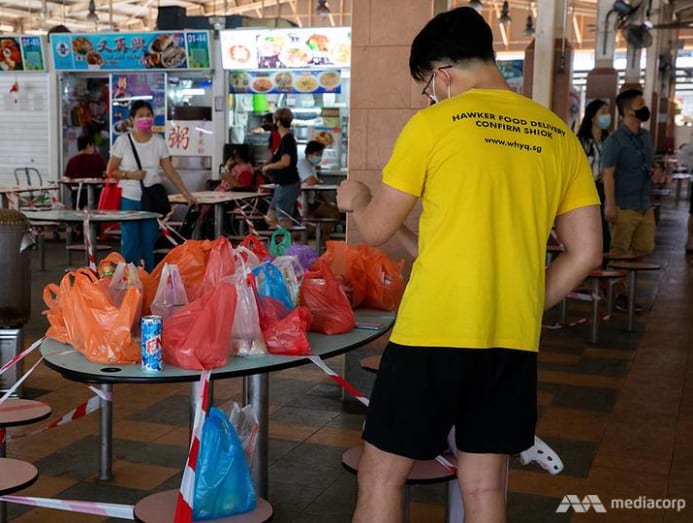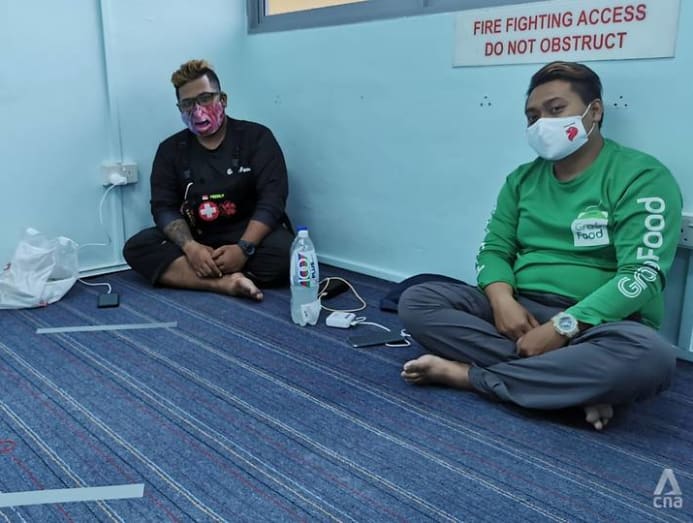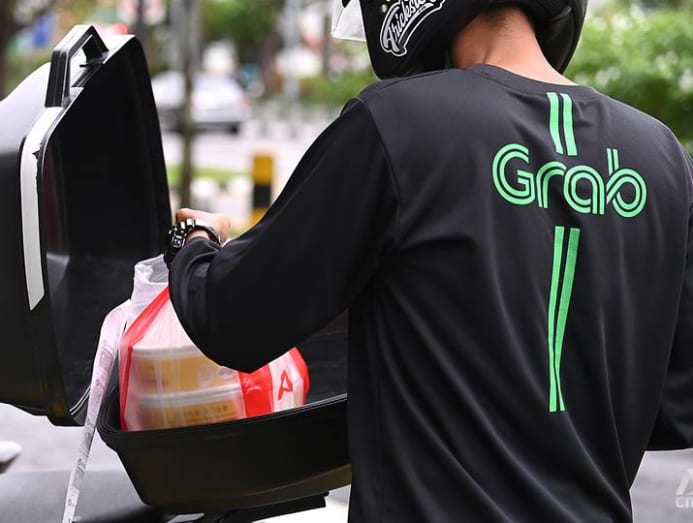commentary Commentary
Commentary: Hawkers and food delivery riders deserve more appreciation
Now, more than ever, when they are faced with more uncertainty and lower incomes, our gestures and tips can be a meaningful and impactful way to say thank you, says Singapore Kindness Movement’s William Wan.
SINGAPORE: We are in the middle of Phase 2 (Heightened Alert), and the headlines aren’t good.
The bigger economic picture can feel like a bunch of alienating figures and graphs. But the impact has cut deep.
To truly see the economic impact of COVID-19 first-hand, take a look at our hawker and the food delivery sectors.
Barely recovering from last year, these sectors are struggling to survive, especially since new restrictive measures such as no dining-in and a return to work-from-home were announced in mid-May and will be in place until Jun 13 at the minimum.
READ: Commentary: We lose more than meals when a loved restaurant shuts for good
Over the past three weeks, we have all had to swap eating out for takeaways and food delivery orders.
We know we must eliminate those public health risks when eating in close proximity have been singled out as high-risk settings, with coffeeshops and eateries identified as places visited by COVID-19 cases during their infectious period.
FEARS OF SHUTTERING FOR GOOD
The Government has announced a one-month rental relief for hawkers, with cleaning subsidies to be dispensed to help 6,000 hawkers tide over this period. That will help alleviate some fears and anxieties.
READ: Commentary: Our unkindness on social media is a mirror to society
But this only papers over the challenges of low footfall. Some hawkers have adapted, turning to technology, but others are in danger of shuttering for good.
Non-tech savvy stallholders can only watch helplessly as their businesses plunge, some as high as by 70 per cent. How painful it must be for these hawkers, who have been in business for decades to envisage giving up their life’s work.
For those who have pivoted to digitalise, many still see lower earnings especially eateries not near residential estates.

78-year-old Lee Ah Meng isn’t giving up without a fight. He has been selling his handmade sweet potato ondeh ondeh and tapioca kueh at Hong Lim Market & Food Centre for 21 years. In normal times, he sells everything by noon. Not anymore.
When an 8Days reporter recently asked him what he would do with his unsold boxes of kueh, he replied stoically: “Never mind lah. I’ll take them to the old folks’ home later.”
WORKING AND BRAVING THE RISKS
Unlike many of us, those in F&B and food delivery can’t work from home. They have to brave the elements and COVID-19 risks to feed our nation.
READ: Commentary: Can the F&B industry and food delivery platforms cope better this time around?
A delivery driver, Jarrold Tham, recently admitted to the media that he is afraid to work with the recent rise in daily cases. He fears for his wife especially because they are planning for a family.
Mr Tham also said that right now, he hardly makes S$100 a week from deliveries as compared to the S$70 to S$100 per day at his peak last year.
Even though online orders have increased, some delivery riders like him have not seen an increase in income, when private-hire drivers are picking up food deliveries to supplement a drop in their earnings.
Just as we recognise that our bus, MRT and taxi drivers are more exposed to the heightened risks of the pandemic but continue to do their jobs, we should also remember the grit and sacrifices of our hawkers and food delivery riders.
One year since the pandemic, why do users, riders and restaurants alike still have complaints about food delivery apps? A business professor and a ride-hailing app founder weigh in on CNA's Heart of the Matter podcast:
SNUBS BY UNKIND EATERY STAFF AND CUSTOMERS
Actor-comedian Hossan Leong appealed on a recent Facebook post for Singaporeans to be “kind and thoughtful” to food delivery riders. He shared the experience of a rider, Jerry Toh, who was snubbed by both restaurant staff and the people he delivered the food to.
Mr Toh shared how restaurant staff would treat walk-ins better than delivery riders, how they have to wait, sometimes for an hour without any explanation, and how they would get shouted at when they check in on their orders.
READ: Commentary: Flaring tempers and public incidents – are we losing it because of COVID-19?
READ: Commentary: Worries over COVID-19 situation are taking a mental toll on Singapore
Mr Toh isn’t the only one. I have heard of customers shouting at delivery riders when they bring their food late or get the orders wrong, yet delivery riders aren’t the only ones responsible for sometimes messing it up.
The same goes for hawker stall operators too. I have seen people at hawker centres who have lost their cool at stall operators waiting at a long queue.
With a surge in take-aways, F&B establishments can sometimes also contribute to delays and oversights. We also know that sometimes food delivery platforms can inadvertently get it wrong and schedule orders despite eateries being closed, so fault-finding and finger-pointing can be a fruitless exercise.
A LITTLE KINDNESS GOES A LONG WAY
Singapore has gotten together to help elderly hawkers go online. There are Facebook groups like Hawkers United - Dabao 2020, and Can Eat! Hawker Food.
On Instagram, where our millennials live, there are accounts like @wheretodapao and @savetheelderlyhawkers that help boost hawkers’ businesses.
READ: The Big Read: As old habits die hard at hawker centres, Singapore seeks to fine its way out
Those who cannot pivot have their champions too. Makansutra founder KF Seetoh recently called on his followers on Facebook to help these “silent sufferers”. He has done much to call attention to their plight.
Other kind-hearted folks include everyday Singaporeans like Kate Yeo and her family who reportedly bought extra food to bless the residents of a halfway house while supporting hawkers.

Equally important is our attitude. It does not cost us anything to be patient and to thank them for their hard work.
Most of us thank our doctors, for instance. Why not our hawkers and food deliverers? Their service is not less important.
READ: Commentary: COVID-19 has shown that we can be gracious. How do we make it last?
Contribute.sg, a ground-up movement supported by the Singapore Kindness Movement, is working with Sengkang Community Club and IllustrateSG to make appreciation cards for food delivery riders in the Sengkang area in June.
Children from kindergartens will be invited to colour these appreciation cards, which will be part of an appreciation pack (including surgical masks and UV protection arm sleeves) to show our gratitude to delivery riders.
A CULTURE OF TIPPING
Is now a good time to relook our tipping culture in Singapore, for those of us who can afford to?
Platforms such as GrabFood already have an in-built option to tip delivery riders for their service. This is a useful option to appreciate their work if you find it awkward to hand over a tip in person.
But the tipping culture could be made more pervasive in Singapore. As a society, we have debated over it for years now saying that it may be a step in the right direction to improve customer service, incomes and the participation of local workers in such sectors.

COVID-19 is a timely opportunity to build this culture of appreciation for our hawkers and food delivery riders. More broadly, how we respond to each other in this pandemic is a test of our character as a people.
Worried as he is, my friend Alfred George who is a food deliverer puts a positive twist to the work he does. "My job is not about putting food on my table. It is about putting food on yours."
Let’s show some appreciation for these frontline food heroes of Singapore in turn and extend a little kindness.
Dr William Wan is General Secretary of the Singapore Kindness Movement.





